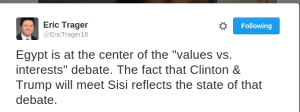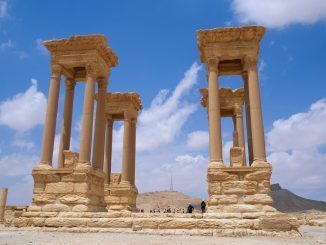
Clinton and Trump’s meeting with Abdel Fattah al-Sisi in New York on the sidelines of the U.N. General Assembly illustrates “one of America’s more uncomfortable foreign relationships”, as described by Time, a US weekly magazine.
Al-Sisi led a military coup in July 2013 ousting President Mohamed Morsi, who had won the Egypt’s first democratically presidential election following the Arab Spring and the overthrow of the longtime autocrat Hosni Mubarak. The military takeover that was led by Sisi, the former chief of Egypt’s armed forces, opened a period of political violence. The army and the security forces killed more than two thousand people, and jailed an estimated 40,000 people, including protesters, students, and journalists. Sisi became president in 2014 in an election that was widely regarded as “a fait accompli,” said the Times.
For many observers, Trump’s meeting with Abdel Fattah al-Sisi isn’t a strange thing as Trump has voiced admiration of a range of authoritarian leaders, hailing Russia’s President Vladimir Putin as a strong leader and praising former Iraqi dictator Saddam Hussein as an effective killer of “terrorists”.
Moreover, Trump’s team released an account of his meeting with Sisi that was striking in how much praise the Republican heaped on Egypt. Trump expressed to Sisi “his strong support for Egypt’s war on terrorism, and how under a Trump administration, the United States of America will be a loyal friend, not simply an ally, that Egypt can count on in the days and years ahead” , as reported by Politico.
Trump has said that if elected president, he will work with Sisi to fight terrorism, describing him in a speech as someone who recognizes that “this ideology of death must be extinguished.”
In this context, human rights defenders believe that if Trump was elected, he would enhance U.S. support for al-Sisi, who casts his regime as a bulwark against extremist groups, said Times.
Mohamed Ahmed, a researcher on Egypt at Amnesty International said, “We hear that Trump will be supporting Sisi in the so-called fight against terrorism and this will lead to cracking down more on human rights, leading to a massive deterioration in the human rights situation in Egypt.”
Regarding Hillary Clinton, Time expects that she won’t make a drastic change in US foreign policy. In the beginning of the military coup in 2013, Obama administration initially maintained a degree of distance from al-Sisi’s government.
The U.S. froze arms deliveries to Egypt in the aftermath of the 2013 coup, but eventually released aid in March 2015, delivering F-16 fighter jets and tank turrets. Recently, Egypt received in May an initial shipment of 762 mine-resistant, ambush protected (MRAP) vehicles from the United States, which will be used in army operations in North Sinai.
The change to Obama’s administration toward providing support to al-Sisi regime appeared within the need to “prioritize the immediate needs of the international fight against extremists like ISIS over human rights concerns, embracing an authoritarian regime in Egypt that is battling ISIS-affiliated militants in the Sinai Peninsula and attempting to police a long desert border with Libya, where ISIS managed to establish itself in the chaos of that country’s civil war,” said the Time.
In addition, when Clinton was as Secretary of State during January Revolution, she rejected Obama’s policy in abandoning Mubarak in January Revolution in 2011.
She told reporters on 25 January 2011, “Our assessment is that the Egyptian government is stable and is looking for ways to respond to the legitimate needs and interests of the Egyptian people.” In the end, she has slowed down her support when she called for a “peaceful, orderly transition to a democratic regime.”
Clinton has also enjoyed close relationship with the autocratic ruler of Egypt saying in 2009 that she considered Mubarak and his wife Suzanne to be family friends.
A realist, during the Arab Spring, Clinton warned about the possible negative effects of pushing Mubarak, a longtime U.S. ally, out of power. Some Egyptian dissidents at the time were disappointed that she had not sided more clearly with the protesters calling for an end to authoritarian rule across the Arab world.
Mohamed Ahmed, a human rights activist, said that Clinton made a very clear statement when millions of people were in the streets protesting Hosni Mubarak. He said, “At the beginning she was not really with change, so we expect that it will likely continue the same U.S. policy.”
Human rights advocates have criticized Clinton for being too slow to abandon Mubarak, and Obama for ultimately embracing Sisi despite his authoritarian tendencies. At the same time, Trump on his campaign trail criticized the Obama administration for withdrawing support from Mubarak. “He supported the ouster of a friendly regime in Egypt that had a longstanding peace treaty with Israel, and then helped bring the Muslim Brotherhood to power in its place,” Trump said in a foreign policy speech in April. Yet in 2011, Trump himself was critical of Mubarak and welcomed his ouster.
In this context, it is not expected that Clinton’s foreign policy regarding supporting autocratic regimes will differ from Trump’s. Before meeting al-Sisi, Clinton did not move away from Trump’s view of Abdel Fattah al-Sisi, as she also said that she will put a comprehensive plan to face the developed terrorist threats even through the internet, adding that she will meet Abdel Fattah al-Sisi and other world leaders to discuss several means to counter ISIS and terrorist threats.
In fact, Clinton’s decision to meet with Sisi, stems from a desire to signal to Arab allies in the region that she will partner with rulers who impose stability, even if those rulers are autocrats.
As a result, countering terrorism as key priority in US foreign policy will make both candidates act with a blind eye towards the human rights violations in Egypt under al-Sisi.
In response, Josh Rogin, a columnist at the Washington Post and a political analyst at CNN, criticized US presidential candidates race for meeting al-Sisi. He wrote on his Twitter account, “watching Trump and Clinton fight over who is closer to Al-Sisi today will be among the more depressing US foreign policy of this cycle.”

On his behalf, Eric Trager, a fellow at the Washington Institute, said on his Twitter account that Trump and Clinton’s meeting with al-Sisi reflects Egypt’s presence in the center of the “values vs interests” debate. The fact that Clinton & Trump will meet Sisi reflects the state of the debate.”

In the same path, a small group of scholars and activists with a focus on Egypt, including some who identify as conservatives, released a letter they had written to both presidential candidates urging them not to meet with Abdel Fattah al-Sisi.
The authors pointed to the thousands of people killed and imprisoned under Sisi’s harsh rule, as reported by Politico.
The letter reads, “Since taking power via a military coup three years ago, President Sisi has overseen not only the complete reversal of Egypt’s nascent democratic transition but also unprecedented human rights abuses.” It adds, “It is not in our interest to embrace him but to use our influence to press for beneficial change in Egypt.”
The letter further states, “Your meeting with Sisi at the UNGA will be taken in Egypt, and around the world, as an endorsement. To meet with him is a policy decision, which should await a later date after much study and assessment of U.S. policy toward Egypt. Therefore, we strongly urge you to readjust your schedule.”
The signatories included:” Michele Dunne of the Carnegie Endowment for International Peace; Robert Kagan of the Brookings Institution; Elliott Abrams of the Council on Foreign Relations; Reuel Gerecht of the Foundation for Defense of Democracies; Neil Hicks of Human Rights First; and Stephen McInerny of Project on Middle East Democracy.”
The letter writers are part of a non-partisan working group on Egypt that has been meeting since 2010.
Their criticism follows that of others including Human Right Watch’s executive director Ken Roth, who wrote on Twitter: “Why does Hillary again want to meet Sisi? He directed 817+ killed in 12 hours in Rabaa Sq” — a reference to a massacre in a Cairo square under Sisi’s watch in 2013.
Since the military coup in 2013, the Egyptian authorities have waged a wide-ranging crackdown against any opposition. Thousands of people were jailed, mainly Islamists, but also leading secular and liberal activists behind January Revolution in 2011.
Egyptian state institutions continue to restrict critics of the government. Rights groups say the current government led by Abdel-Fattah al-Sisi, who was the Defense Minister who led Morsi’s overthrow, is even more repressive than Mubarak’s 29-year rule.
On Saturday, a Cairo court ruled in favor of a freeze on the assets of five of Egypt’s top human rights activists. Rights groups fear that the move could pave the way for a prosecution of the few remaining rights advocates documenting government abuses. Twelve human rights defenders have been banned from leaving the country.
Rights groups have also documented hundreds of disappearances, in which detainees are held secretly and without acknowledgement by the state. According to tally by the Committee to Protect Journalists, Egypt held 23 journalists in its jails at the end of 2015, a figure that placed it second only to China among the world’s worst jailers of journalists.



